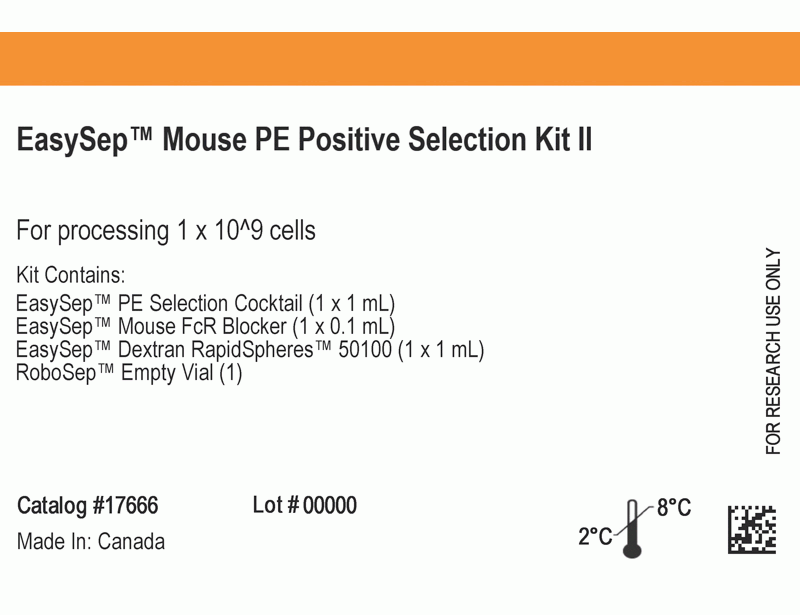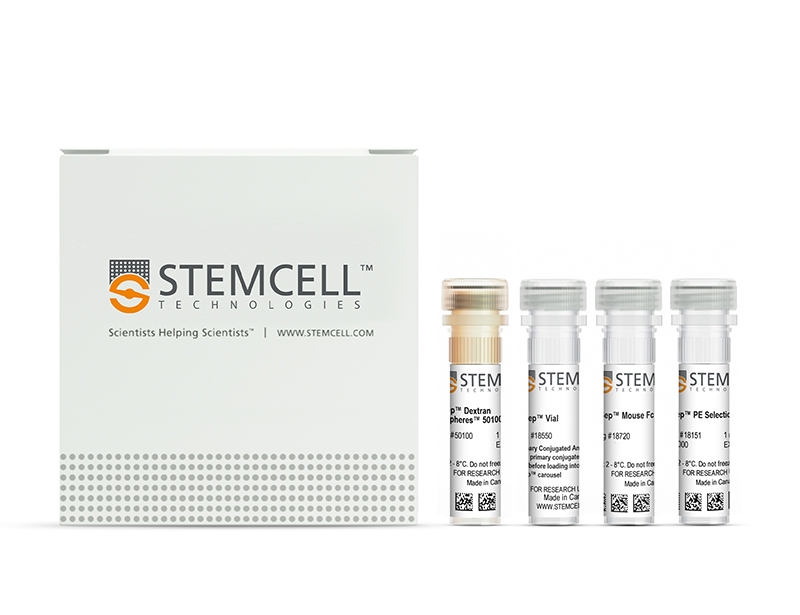概要
The EasySep™ Mouse PE Positive Selection Kit II is designed to isolate cells that are labeled with PE-conjugated antibodies. Desired cells are targeted with antibody complexes recognizing PE and dextran-coated magnetic particles. Labeled cells are separated using an EasySep™ magnet without the use of columns. Cells of interest remain in the tube while unwanted cells are poured off.
This kit replaces the EasySep™ Mouse PE Positive Selection Kit (Catalog #18554).
For highly purified particle-free cells, we recommend the EasySep™ Release Mouse PE Positive Selection Kit (Catalog #17656).
This kit replaces the EasySep™ Mouse PE Positive Selection Kit (Catalog #18554).
For highly purified particle-free cells, we recommend the EasySep™ Release Mouse PE Positive Selection Kit (Catalog #17656).
技术资料
| Document Type | 产品名称 | Catalog # | Lot # | 语言 |
|---|---|---|---|---|
| Product Information Sheet | EasySep™ Mouse PE Positive Selection Kit II | 17666, 17696 | All | English |
| Product Information Sheet | RoboSep™ Mouse PE Positive Selection Kit II | 17666RF, 17696RF | All | English |
| Safety Data Sheet 1 | EasySep™ Mouse PE Positive Selection Kit II | 17666 | All | English |
| Safety Data Sheet 2 | EasySep™ Mouse PE Positive Selection Kit II | 17666 | All | English |
| Safety Data Sheet 3 | EasySep™ Mouse PE Positive Selection Kit II | 17666 | All | English |
| Safety Data Sheet 4 | EasySep™ Mouse PE Positive Selection Kit II | 17666 | All | English |
| Safety Data Sheet 1 | RoboSep™ Mouse PE Positive Selection Kit II | 17666RF | All | English |
| Safety Data Sheet 2 | RoboSep™ Mouse PE Positive Selection Kit II | 17666RF | All | English |
| Safety Data Sheet 3 | RoboSep™ Mouse PE Positive Selection Kit II | 17666RF | All | English |
| Safety Data Sheet 4 | RoboSep™ Mouse PE Positive Selection Kit II | 17666RF | All | English |
数据及文献
Data

Starting with mouse splenocytes, the purities of the start and final isolated fractions in the above example are 20.5% and 91.6%, respectively, using a PEconjugated anti-mouse CD4 antibody and EasySep™ Mouse PE Positive Selection Kit II.
Publications (1)
Journal of medicinal chemistry 2019 dec
Enzymatic Preparation of 2'-5',3'-5'-Cyclic Dinucleotides, Their Binding Properties to Stimulator of Interferon Genes Adaptor Protein, and Structure/Activity Correlations.
Abstract
Abstract
Cyclic dinucleotides are second messengers in the cyclic GMP-AMP synthase (cGAS)-stimulator of interferon genes (STING) pathway, which plays an important role in recognizing tumor cells and viral or bacterial infections. They bind to the STING adaptor protein and trigger expression of cytokines via TANK binding kinase 1 (TBK1)/interferon regulatory factor 3 (IRF3) and inhibitor of nuclear factor-$\kappa$B (I$\kappa$B) kinase (IKK)/nuclear factor-$\kappa$B (NF$\kappa$B) signaling cascades. In this work, we describe an enzymatic preparation of 2'-5',3'-5'-cyclic dinucleotides (2'3'CDNs) with use of cyclic GMP-AMP synthases (cGAS) from human, mouse, and chicken. We profile substrate specificity of these enzymes by employing a small library of nucleotide-5'-triphosphate (NTP) analogues and use them to prepare 33 2'3'CDNs. We also determine affinity of these CDNs to five different STING haplotypes in cell-based and biochemical assays and describe properties needed for their optimal activity toward all STING haplotypes. Next, we study their effect on cytokine and chemokine induction by human peripheral blood mononuclear cells (PBMCs) and evaluate their cytotoxic effect on monocytes. Additionally, we report X-ray crystal structures of two new CDNs bound to STING protein and discuss structure-activity relationship by using quantum and molecular mechanical (QM/MM) computational modeling.

 网站首页
网站首页




